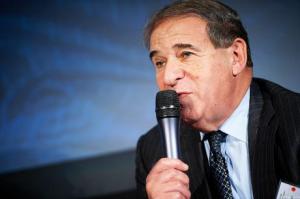(This blog was oringially posted at – openDemocracy)
Much of the press commentary following Leon Brittan’s death last week has been confined to his record on the British political scene and recent allegations of sex abuse. Strangely absent amidst the obituaries of this ‘clever and hard-working’ man, however, is any meaningful discussion of Brittan’s ten-year stint as EU Commissioner for Competition and Trade. While the Guardian’s commentariat ignored his EU career entirely, discussion elsewhere rarely ventures beyond vacuous statements, describing Brittan as ‘an “inspiring leader” who helped shape the EU’, and a ‘committed European’ whom the Tory Eurosceptics suspected of having gone ‘native’. Yet, a closer look at Brittan’s role in EU politics reveals a rather more problematic record of the Bulldozer—his nickname in the Brussels bubble—than would appear from the platitudes.
Brittan arrived in Brussels in 1989. Harbouring strong antipathy to the social-democratic, Keynesian consensus that had characterised economic policy-making across much of post-war Western Europe, Brittan came to play a decisive role in carrying forward the neoliberal revolution begot by his erstwhile boss in the Cabinet.
At the onset of the 1990s, he spearheaded the restructuring of EU competition policy around the ideological principles of market fundamentalism. This gradually gave rise to a regime strongly opposed to state aid to industry and the exemption of publicly-owned utilities—telecommunications, energy, transport, and so on—from competition regulations. Working closely with UNICE (the European employer’s organisation) and the European Roundtable of Industrialists (the elite club of CEOs of major European corporations), the principal aim was to free transnationally-oriented capital from seemingly obsolete ‘social regulatory burdens’. As Brittan later put it, his work consisted of ‘bulldozing through reforms which levered open markets, intensified competition and put public sector monopolists on the back foot’.
As Trade Commissioner (1993-1999), Brittan presided over the internal reorientation of EU trade policy towards a much more aggressive promotion of the interests of big business. Impressed by the privileged access of corporate lobbyists to his American counterparts, Brittan was eager to give business commanding influence over the formulation of EU trade policy. Amongst other things, Brittan established a “market access unit” within the Directorate-General for Trade in the mid-1990s. Its “primary role”, explains Gregory Schaffer, Professor in International Trade and Investment Law, “was to engage with and help defend EU business interests regarding trade problems that they faced.” Wider social, development, and environmental considerations were relegated to a subsidiary position in the project to open up foreign markets to European business.
On the international scene, Brittan played a central part in the finale of the Uruguay Round of international trade talks which led to the creation of the World Trade Organisation in 1994. Heralded by western political and corporate elites as a watershed in multilateral trade which would usher in an era of lasting economic growth and prosperity for all, the experience of many of the world’s poorest countries with trade liberalisation has been rather less salutary.
As documented by Joseph Stiglitz and many others, sub-Saharan Africa, for example, saw its already meagre share of global trade decline even further, while governments around the world faced new pressures to privatise and liberalise public services, deregulate their markets, restrict state subsidies, and expose their economies to transnational capital flows with often devastating social and economic consequences.
In a particularly shameful episode, Brittan used his political clout to personally intervene on behalf a coalition of 39 pharmaceutical companies in their now infamous lawsuit against the South African government which took place in the midst of the country’s harrowing HIV/AIDS crisis. Big Pharma sued the Mandela government in 1998 for its alleged violation of the WTO intellectual property rights agreement by allowing for the parallel importation of medicines, a practice whereby countries take advantage of companies’ differential pricing policies and shop for the cheapest medicines on the international market. Although perfectly legal under WTO rules, in a letter to then Deputy-President Thabo Mbeki, Brittan complained that the revised Medicines Act “would negatively affect the interest of the European pharmaceutical industry”, seemingly disregarding the right to health of South Africans, including the millions dying for lack of affordable HIV treatment.
Meanwhile, another of Brittan’s priorities was to deregulate the international market in services provision, especially in the realm of finance and banking. To achieve this, Brittan encouraged senior executives in the services industry to form an organisation which could more effectively communicate their demands to EU trade officials in the context of the WTO GATS framework. The product of Brittan’s ‘reverse lobbying’ was the European Services Forum, one of the most influential business associations in Brussels whose members include the Deutsche Bank, HSBC, the European Banking Federation, and major corporations across other services sectors.
Brittan was to be duly rewarded for his loyalty to big finance. After leaving Brussels at the turn of the millennium, he was appointed chairman of the LOTIS (Liberalisation Of Trade In Services) Committee, the powerful lobby group representing the financial industry in the UK, and later became vice-chairman of UBS Investment Bank.
In sum, Brittan’s imprint on British political life was relatively short-lived, yet his legacy in facilitating the corporate capture of the EU’s trade agenda continues to reverberate to this day. As opposition to TTIP, the EU-US trade and investment pact currently under negotiation, escalates, it is perhaps no coincidence that it was Brittan who first endorsed the idea of a Transatlantic Marketplace some two decades before it has come to fruition.
Obviously, Brittan was not alone in leading the neoliberal crusade at the EU level. But he was an important enabler of the interpenetration of political and corporate power which lies at the heart of today’s ‘post-democratic malaise’ in Europe and beyond.

